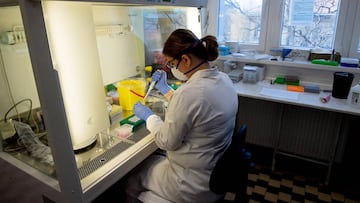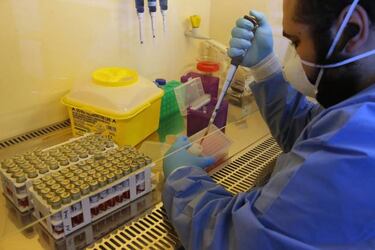Coronavirus in UK: how to volunteer for the clinical trials
When a vaccine or cure for Covid-19 is discovered, it will need to be tested on humans before becoming available commercially. Here’s how you can apply to be a volunteer.

The quest to find both a vaccine and a drug that can cure Covid-19 began when the first cases started to appear in China at the start of the year. China has openly shared all of the information it has from its own studies of the new coronavirus - the structure, geometric blueprint and sequencing of the virus, to laboratories around the world. That will help to speed up the process. Some researchers claim to be already close to finding ways of stopping the virus from multiplying – for example, the Monash University's Biomedicine Discovery Institute (BDI) and the Peter Doherty Institute of Infection and Immunity have discovered that Ivermectin, one of the components in head lice lotion, could be used in a vaccine to prevent coronavirus.
Mayo Clinic is leading a national study on treating patients with #COVID19 using plasma from those who have already recovered. https://t.co/VceruTSoRP via @StarTribune #coronavirus
— Mayo Clinic (@MayoClinic) April 4, 2020
The race is on to find a cure for Coronavirus Covid-19
All of the drugs and medical devices being devised to treat or prevent Covid-19 will need to undergo rigorous testing – first in a lab, then on animals and eventually on humans. Clinical trials of pharmaceutical drugs are used to compare treatments, usually with the use of a placebo – an harmless dummy treatment which has no effect at all on the patient. Medical trials also require people for the drugs to be tested on – either patients who are suffering from the condition the drug is designed for, or healthy people with no medical issues.
In the United Kingdom, those who want to volunteer for medical trials should first consult their local GP or surgery to find out if and where trials are being conducted. You can also contact the National Institute for Health Research through their website. The World Health Organization also is regularly on the lookout for volunteers to take part in drugs trials all over the world.
Medical trials are not just to test drugs’ effects on the human body for illnesses for which there is no cure at present, they are also held to improve or replace treatment that is currently in use.
Some clinical trials offer payment for taking part – sometimes this can be a very generous amount, from hundreds of pounds to several thousand pounds depending on the company and what is expected from you. Other trials will offer to pay travel expenses but nothing more.

The risks involved in taking part in a clinical drugs trial
Related stories
Most medical trials are safe as the drugs being tested will have already undergone extensive testing on animals but that is not to say there are no risks. In 2006, a trial to test a new drug Theralizumab ended with six out of the eight volunteers taking part hospitalised with multiple organ failure. All six men eventually recovered but the drug was withdrawn.
Once a drug successfully passes the Phase 1 trial stage, it will then need to be tested on larger groups of volunteers. If it passes the Phase 4 trial stage, will it be able to be licensed and put on the market. Anyone taking part in clinical trials will be legally entitled to receive a copy of the results. If you decide you would like to be involved in a clinical trial in the UK, you can start by getting in touch with the NHS-run Be Part of Research – they will be able to give you all the information you need.

